Home inspectors are professionals who thoroughly inspect residential properties, most commonly on behalf of buyers, to identify structural deficiencies or needed repairs. This career is ideal for people who enjoy construction and want unlimited earning potential and flexibility. Learning how to become a home inspector involves knowing the requirements, taking home inspection courses, passing the licensing exam, and completing applications. Below are the steps you need to follow to launch a successful home inspector career.
Here are the eight steps on how to become a home inspector in your state:
1. Confirm the Licensing Requirements in Your State
The first step to your new career is learning the requirements to become a home inspector in your state. The majority of states require you to complete anywhere from 60 to 140 hours of coursework and take a licensing exam. Many states additionally require you to complete on-the-job training under the supervision of an experienced inspector, with requirements ranging from 12 hours to one year.
Learn more about how to become a licensed inspector in your state:
Licensing Requirements in Your State
2. Find Home Inspection Courses & Training
In some states, home inspectors don’t need a license. However, if you want to establish a successful and sustainable home inspector career, you should plan to take classes and educate yourself on the home inspection process, construction, and common issues you’ll face. Focus on topics like the following:
- Home types
- Home systems and infrastructure
- Home construction
- Standards of practice and code of ethics
- Best business practices
- Risk management tips for home inspectors
If your state has education qualifications to be a home inspector, you’ll need to complete required coursework within a given time frame. Many home inspector training schools offer online and in-class options, so make you research the training options available to choose the right one.
A few of the top home inspector training schools include:
Providers | |||
Best For | Home inspectors wanting comprehensive courses online or in-person | Aspiring and current home inspectors wanting the largest library of educational content | Aspiring inspectors wanting an interactive and self-paced licensing course |
Key Features |
|
|
|
Starting Price | $699 | $49 per month | $799 |
Learn More |
3. Pass Your State’s Home Inspection Licensing Exam
Learning the steps to becoming a home inspector can be confusing because the requirements and process differ so much from state to state. Not all states require you to pass an exam before becoming a home inspector, but this is the next step of the process in many other states.
Most states use the National Home Inspection Exam, a four-hour test consisting of 200 multiple-choice questions. The exam is “scale scored” from 200 to 800, with 500 as the pass point. The cost varies by state but is generally around $200 to $300.
Take a look at the map below to determine if a licensing exam is required and the testing provider in your state:
No Exam Required | PSI/AMP | |
|---|---|---|
|
|
|
If your state doesn’t require an exam, you can head to the next step; otherwise, you will take your exam through either PSI/AMP or Pearson VUE. Both are national providers of real estate industry-based examinations, typically administered on a computer at a testing center in a nearby location.
To register to take your home inspection exam on either website, you’ll be required to create an account to gain access to the scheduling portal. From there, you can schedule at a test location near you and pay your fee directly on the website using a credit or debit card. For more information on testing in your state, visit the National Home Inspection Examination website.
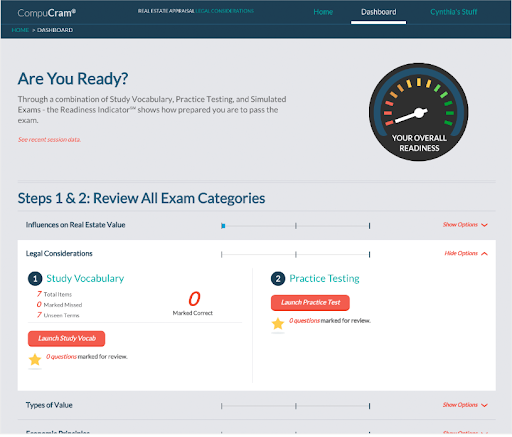
Sample readiness meter from CompuCram (Source: CompuCram)
The National Home Inspector Exam has an average pass rate of 55%, so it is not an easy task to complete. To get the best preparation and guarantee that you’ll be able to pass on your first attempt, consider an exam prep program like CompuCram. For $99, CompuCram provides you with flashcards, interactive study games, practice exams, and a readiness indicator to track your progress. Even more, they guarantee you’ll pass the exam or you’ll get your money back.
4. Complete Home Inspector Applications
After you’ve passed your exam in the applicable states, you may be required to complete and submit an application to be a home inspector. For example, to become an inspector for homes in Texas, you must mail an Application for Apprentice Inspector License with a $60 fee, get fingerprints taken, and pass a background check. If you live in a regulated state, learn all the requirements to be a home inspector.
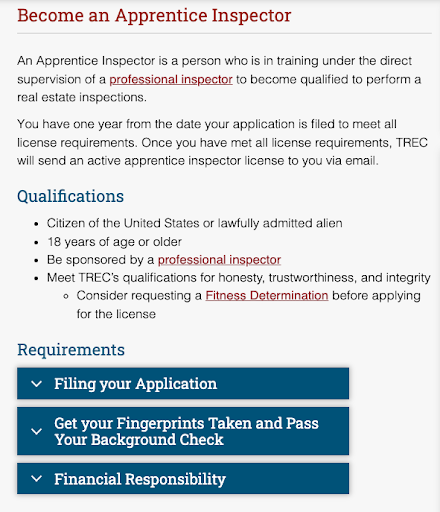
Texas Apprentice Inspector requirements (Source: Texas Real Estate Commission)
5. Acquire Errors & Omissions & General Liability Insurance
Since being a home inspector requires you to regularly provide advice and services to clients, it’s necessary to have errors and omissions (E&O) and general liability (GL) insurance. E&O insurance protects you and your company if a client or homeowner accuses you of failing to report findings and decides to take legal action against you. GL insurance protects you from claims of missing or damaged items from the property.
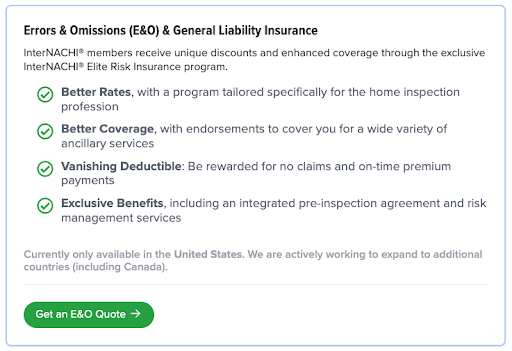
InterNACHI E&O and General Liability Insurance (Source: InterNACHI)
If you choose to work for an established home inspection firm, your employer may provide insurance for you. Otherwise, you’ll need to purchase it for yourself. The costs and specific insurance requirements vary from state to state, but it’s a necessary part of every home inspector’s business.
Find these home inspector insurance plans through companies like Next Insurance or get them directly from the International Association of Certified Home Inspectors (InterNACHI). You can also search for home inspector insurance plans specific to your state.
6. Choose Your Home Inspector Career Path
Once you pass the licensing exam or are otherwise qualified in your state, deciding the next steps of how to become a home inspector is a more individual decision. Consider how you want your home inspector career to look by choosing the right business model for your income goals and lifestyle. There are three primary career paths to consider:
Each career path has unique challenges and advantages, especially when starting your home inspector career and learning what it takes to be a home inspector. This career can provide an unlimited income, which is extremely appealing to those with an entrepreneurial spirit. However, there are a variety of factors that could impact your earning potential. For example, here are a few cost considerations when beginning your inspection career:
- Competition and market saturation
- Advertising and marketing costs
- Tools and equipment
- Liability insurance and errors and omissions insurance
- Association dues
- Office space, furnishings, and equipment
- Operating expenses like bookkeeping and tax prep
- Vehicle cost and maintenance
Each career path in the home inspection industry has unique challenges and advantages, so make sure you carefully consider each option before choosing the path that best fits your goals and ambitions.
According to the Bureau of Labor Statistics, the national average income for home inspectors was $61,640 in May 2021. A salary estimate for 2023 from ZipRecruiter is $61,286, although individual state averages range from $42,000 to $67,000. Make sure you carefully consider each option before choosing the path that best fits your goals and ambitions.
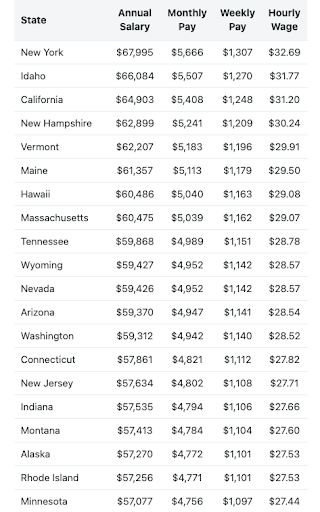
Average home inspector salary by state (Source: ZipRecruiter)
7. Start Your Home Inspection Career
After you choose the right career path for you, the next steps of learning how to become a residential home inspector will be focused on marketing and working with clients. You’ll need strong communication skills when interacting with new homeowners as well as real estate professionals to attract new clients, generate leads, and start building your reputation.
Make sure you set yourself up for success by creating a business plan that outlines your goals and shows you the path to achieve them. In addition, start networking with professionals in the real estate industry right away by attending events and joining associations. A few nationally recognized associations include:
- National Association of Home Builders
- American Society of Home Inspectors (ASHI)
- International Association of Certified Home Inspectors (InterNACHI)
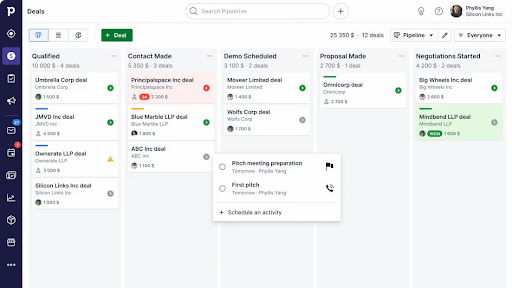
Visual pipeline example in Pipedrive (Source: Pipedrive)
As you build valuable relationships, make sure to develop a strategy to maintain each relationship. Consider sending a handwritten card or an email to new acquaintances or organizing a lunch or coffee get-together. Using a customer relationship manager (CRM) like Pipedrive, you can keep track of all your contacts, including professionals, clients, and leads.
Pipedrive provides an affordable, easy-to-use visual pipeline ideal for new home inspectors. It includes reminders, automation, and lead prioritization, so you can be sure you’re nurturing each individual relationship.
8. Keep Learning With Continuing Education Opportunities
Some states require home inspectors to take continuing education (CE) classes to keep their licenses current. Take a look at the map below for more information:
Even when you have a thriving home inspection career, and even if it’s not required by your state, it’s important to continually take classes to learn more and stay updated about changes in the construction industry. A career in home inspection requires you to constantly learn new skills to stay competitive, so consider taking professional development and CE certification classes for home inspectors throughout your career.
Plus, home inspection is unique as there are various ways you can become a specialist and separate yourself from other local inspectors. For example, you can get certified as a Certified Residential Mold Inspector or a Level 1 Infrared Thermographer. The most common and well-known certifications and specialties for home inspectors include the following:
- Certified Wood Destroying Organisms (WDO) Inspector: This certification course teaches you how to find wood damage in a home due to termites, beetles, and some wood-decaying fungi.
- Certified Garage Inspector: This teaches you how to find structural damage and construction breakdown in and around the garage.
- Certified Deck Inspector: With this certification, you’ll know how to examine a deck’s structural and construction issues for buyers and sellers.
- Certified Radon Tester: Complete this training to understand the radon detection process and how it can affect homeowners.
- Certified Mold Inspector: This certification course enables you to identify different types of mold and understand how they affect the home’s structural integrity and homeowner health.
- Certified Commercial Property Inspector: A commercial inspection course teaches you how to inspect important aspects such as the wiring, construction, plumbing, and framework of different spaces used for business, like retail, manufacturing, office, and industrial spaces.
Additional certifications can set you apart from your competition and help you build trust with potential clients and referring agents. Plus, many of these certification courses are free. Check out the over 60 certifications available through the International Association of Certified Home Inspectors (InterNACHI).
Bottom Line
Learning how to become a home inspector is somewhat confusing because every state in the U.S. has unique requirements. However, by reading your state’s requirements, completing education, and choosing the right home inspector career path, you can become a successful home inspector.